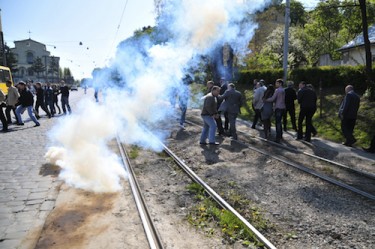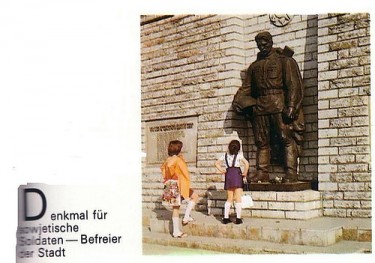From watching Russian television this week, you might think that the annual May 9 commemorations of the defeat of Nazi Germany in Lvov, Ukraine, were under siege from throngs of neo-Nazi, Ukrainian nationalists.
Television footage showed hooded young Ukrainians attacking World War II veterans, giving Nazi salutes, and chanting nationalist slogans. As they ripped St. George ribbons from people's shirts, it seemed that Ukrainian youth had forgotten the terrible sacrifices made by the Soviet Union to defeat Germany.

Supporters of the right-wing Svoboda party and people wearing St. George ribbons clash during Victory Day celebrations in Lviv, Ukraine. Photo by Pavlo Palamarhuk, copyright © Demotix (05/09/2011).
There are few historical events that evoke more passion across the vast space of the former Soviet Union than World War II. And for good reason. Even conservative estimates of the cost of the war are unimaginable: more than 20 million dead.
In Russia, May 9 – known simply as Victory Day – is a day for Russians to honor the terrible sacrifices made to defeat Hitler's Germany in what is widely known as the Great Patriotic War. Indeed, for many Russians, these sacrifices represent nothing less than the simple and glorious triumph of good over evil.
For people in regions caught between the Soviet Union and Germany, however, the legacy of May 9 is not so simple. In Ukraine, for instance, it is the day to remember the terrible sacrifices made during the war – as well as the day that ended Ukraine's hopes of independence from the Soviet Union. Indeed, Ukrainian nationalists had hoped to take advantage of the war to fashion an independent Ukraine.
Since the disintegration of the Soviet Union, both the Russian government and some ethnic Russians still living in the newly independent republics have sought to defend the Soviet Union's historical legacy in the face of what they see as unfair historical accounts of Soviet imperialism.
Nationalists, on the other hand, have sought to cement their position as independent nations in the face of what they see as Russia's neo-Soviet imperial ambition.
This simmering tension reached the surface in Tallinn, Estonia, in 2007, when Russians openly clashed with authorities after the Estonian government announced that they would be moving a World War II monument known as the Bronze Soldier. Soon after, an unprecedented Russian cyber attack shut down the Estonian government.
The May 9 clashes in Lvov seemingly presented another example of this simmering tension. With images of Ukrainian nationalist groups attacking aging World War II veterans, the Russian media had the perfect opportunity to paint Ukrainians as proto-fascists, intent on desecrating the sacred memory of Russian sacrifices in the Great Patriotic War. For instance, Russia Today‘s story on the clashes reported that:
Not everyone regards Victory Day as a cause for celebration. In Western Ukraine, nationalist party members have violently disrupted a memorial service as veterans paid tribute to those who perished in the war . . . Unlike most of the post-Soviet region on May 9th, the western Ukrainian city of Lvov became a vicious display of neo-Nazism. Several thousand activists from radical nationalist parties blocked the entrance to Red Army soldiers’ cemeteries, preventing war veterans from getting inside and paying tribute.
The clashes also fostered a wide-ranging debate on Oleg Kozyrev‘s blog [ru], after he posted a clip from Russian television detailing the events. In hundreds of comments, bloggers debated the meaning of the clashes. Were the clashes signs of a growing fascist, neo-Nazi movement in Ukraine? Or were they result of a small minority of idiotic Ukrainian ultranationalists?
One of the most interesting parts of the debate centered around an blog post [ru] from Egor Kustov (LiveJournal user ru-indeec), a Lvov-based Russophone freelance copywriter. His eyewitness account gave a more complete version than the one on Russian television:
Меня не интересует политика, но всё же не могу не написать о том, очевидцем чего я стал сегодня от львовского Холма Славы. Жаль, не взял фотоаппарат. Итак, прогуливаясь по Лычаковской, я увидел большую группу людей с красными и российскими флагами, транспорантами, плакатами. Я, конечно, читал, что акция пророссийской партии “Русское единство” то ли состоится во Львове, то ли не состоится… запутано там всё у них было. Ну вот, думаю, всё же приехали. […] Они, как по команде, вдруг стали выкрикивать лозунги, оскорбляющие местных жителей. Причём, заметьте, лозунги не политические, а оскорбляющие людей по национальному признаку. Больше всего запомнилось “Хохлы – параша! Победа эта наша!”, “Смерть Галичине!”… были и прочие. Конечно же, спустя пару минут завязалась потасовка. Поскольку численный перевес был, естественно, не на стороне провокаторов, им пришлось убегать. И тут с их стороны раздались выстрелы. […]
Mr. Kustov's account of the Russian provocateurs complicated the clean narrative of Russian victimhood. In a subsequent post [ru], Mr. Kustov denied allegations that he had written this eyewitness account for money and stated that he was simply trying to defend Lvov's image. He wrote:
[…] Такую акцию, в которой участвуют провокаторы с обеих сторон, не сложно устроить в любом городе. В Москве тоже бывают массовые беспорядки с участием больших групп скинхедов (в масках, со знамёнами и т.д.), но ведь СМИ после этого не навязывают мнение, что всё население города – фашисты? […]
For Mr. Kustov, these clashes were simply a media-created tempest in a teapot, the product of extremists on both sides. And there is no sign that the furor around these clashes is settling down. Two days after the clashes, the Russian Duma issued a statement calling on the Ukrainian authorities to punish the Ukrainian nationalists behind the clashes. Mr. Kustov ended with a saying:
Во времена холодной войны между СССР и США кто-то из политиков (не помню кто именно) сказал: “Фермеру из Оклахомы и крестьянину с Поволжья ведь нечего делить. Поэтому им война не нужна. Она нужна политикам”.
And that is perhaps the biggest untold story of these clashes: Mr. Kustov and the silent majority of Russians and Ukrainians in Lvov have little practical use for this big political game.









3 comments
Ukrainians have every right to make a stand against any acts that glorify communism. I suggest people read “The Black Book of Communism” which should be translated into Ukrainian and Russian languages. The French book describes a history of repressions, both political and civilian, by Communist states, including genocides, extrajudicial executions, deportations, and artificial famines. The book was originally published in 1997 in France under the title Le Livre noir du communisme: Crimes, terreur, répression by Éditions Robert Laffont. In the United States it is published by Harvard University Press.The book was authored by several European academics and edited by Stéphane Courtois.
There are two things in the article hard certainly to quarrel with: both still a very few Lvov residents de facto oppose the Victory Day as a mark commemorating a victory over a fascist enemy and not all of the being attacked at the Second War Memorial site were the ethnic Russians but the Ukrainians either.
Sharp, to the point M.Kerjman’s writing style is well recognizable: political turmoils benefit only a few always.